In Tunisia, you will run into many spice and herb merchants. It is a perfect opportunity to fill up your spice cupboard: there is plenty of spices to choose from and prices are very reasonable. I have created a list of popular and traditional Tunisian spices. That will help you to buy the right spices for your needs when wandering around the Tunisian spice shops. After reading this you will get to know the essential spices for Tunisian cuisine.
How to store popular Tunisian spices
Spices are very vulnerable and need correct storage to retain their freshness. The best way to store your traditional Tunisian spices is in a dry, dark, and cool place. This way the spices will stay fresh the longest and won’t transfer flavors. An airtight glass container is the best way to keep your spices fragrant and fresh as long as possible. Plastic containers and plastic bags are not as airtight as glass and slowly the air damages the spices.
When I cook at home, I always save all the possible glass jars: pasta sauce, olives, jams, etc. The spices are often sold on plastic bags in Tunisia. When I return home, I will transfer the spices into the glass jars that I have saved for this. It is the most ecological way to store your spices and you also save money.
Keep your spice cupboard organized. Label the jars with the name of the spice and date. Get rid of the spices that are discolored, smell weak or it’s caking. Might be a bit hard to throw old spices away. But trust me there is no point to cook with spices that aren’t adding any flavor to the dish. To avoid this kind of situation, plan carefully what spices to purchase and buy only an amount that will be used.
Read also: 10 Popular Tunisian Sweets You Need To Try
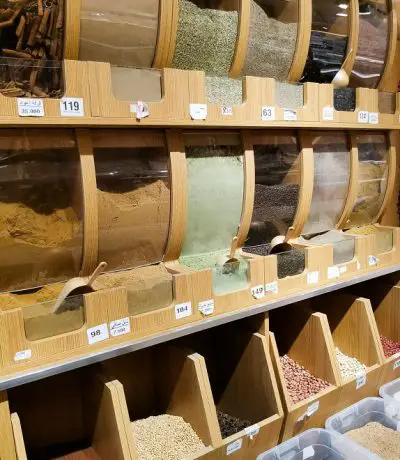
The most popular Tunisian spices and how to use them
1) Tabil / Tabel – Traditional Tunisian Spice Blend
Tabil is one of the most popular spices in Tunisian cuisine and is also commonly used in North African cooking. Tabil mix has a warming and earthy flavor. It’s a spice blend made of coriander, cumin and caraway seeds, red pepper flakes, dried garlic, black pepper, bay leaves, ginger powder, dried mint, and salt.
This blend is perfect for marinating meat, stews, and roasted vegetables. Tabil is also an important ingredient in many traditional Tunisian dishes like Ojja, couscous, Osben, and pasta. The best substitutes for Tunisian Tabel mix are Ras el hanout blend, allspice, and Baharat. You can also add equal parts of spices that the Tabil mix is made of. Or maybe you could try to make your own Tabil mix at home.
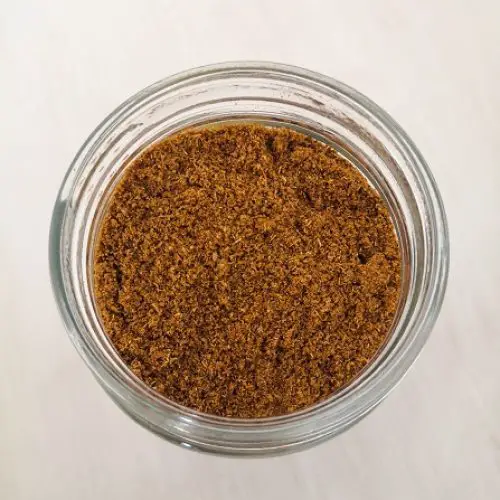
2) Kamoun powder – Popular Tunisian Fish Spice
Kamoun is a Tunisian spice mix, its main ingredient is cumin. It’s mainly used in fish dishes but it’s also used in a dish called Kamounia. Kamounia is a traditional Tunisian stew made of organs and beef meat. Kamoun powder adds rich, warming, and slightly sour flavor to the dish. If you like to cook fish dishes then the fragrant Kamoun is a great addition to your spice collection. Otherwise, the best way to substitute it is ground cumin. If you are missing cumin then the closest alternatives are ground caraway and coriander.
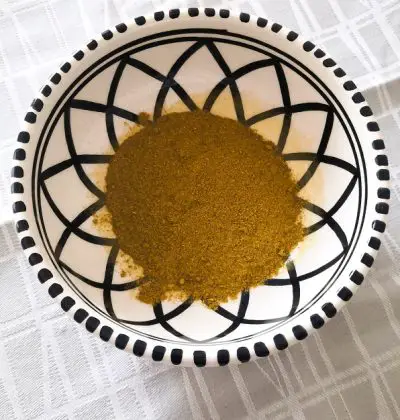
3) Paprika and chili powder – Add the heat in Tunisian dishes
Paprika powder is a spice made of grounded dried peppers. It is an essential ingredient for every kitchen. Some of the paprika and chili powders are very mild in taste adding bitterness and a touch of fruitiness to a dish. Others add plenty of heat to the dish. This versatile spice can be used in marinades, stews, sauces, and soups. It goes well with poultry, meat, fish, seafood, and vegetables. The best alternative for paprika and chili powders are harissa, fresh chili, Cajun, chili flakes, hot sauce, and cayenne pepper.
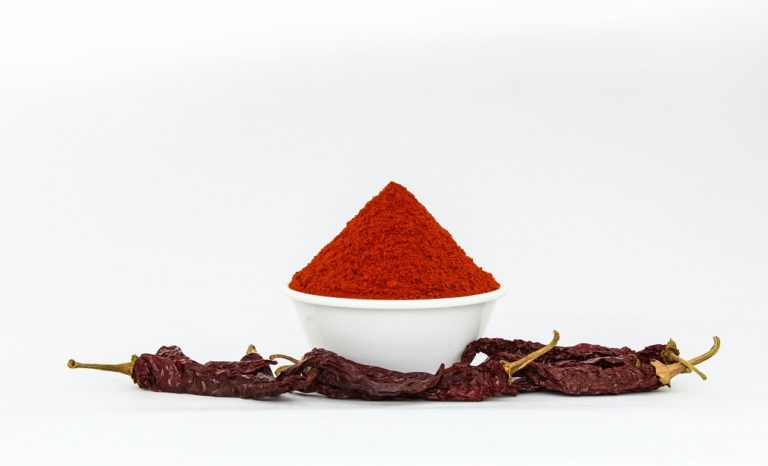
4) Turmeric – Tunisian natural anti-inflammatory
Golden turmeric is famous for its many health benefits. Being rich in both color and flavor, it adds earthy bitterness and depth to the food. It’s often paired with fats like ghee, butter, cheese, or coconut oil to balance the strong taste. In Tunisia, it is used in meat and poultry dishes: Klaya, Nwasser, and Djej Mosli. It also gives the yellow color and flavor for traditional Tunisian Tajine.
On my last trip to Tunisia, I bought 500 grams of Turmeric and it cost 3TN. It is very affordable! The negative side of turmeric is that it stains everything it touches: hands, tables, clothing, cutting board, and plastic jars. So, pay attention when using it.
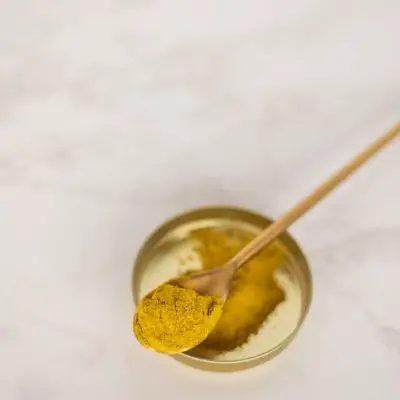
5) Mint – Aromatic and typical Tunisian herb
Both fresh and dried mints are very typical ingredients in Tunisian cuisine. In Tunisia, fresh mint is mainly used in teas and dried one in cooking. Mint has a sweet and delicate menthol flavor. The fresh mint has a bolder taste than the dried one.
A great tip is to add dried mint in salads! Yummy! Or try to pair it with a smoothie, lamb and beef meat, drinks, herb dressing, and fruits. Rather than buying pre-dried mint from stores. Tunisian people buy a fresh mint bouquet and air-dry it at home. During the summertime, it takes only a couple of hours and the airily hanged mint bouquet has dried.
Read also: The best Tunisian drinks you have to try!
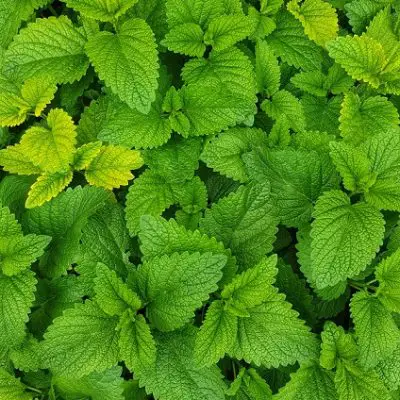
6) Mloukhia – traditional herb powder for Tunisian cuisine
Mloukhia is also known as molokhia is a powder made of herb Jew’s Mallow. In Tunisia, this herb powder is used as the main ingredient in a festive dish called Mloukhia. It’s a lamb stew cooked traditionally for many hours. The dish has a dark green color and a very unique taste. Mloukhia powder is an essential part of Tunisian cooking but it’s not the most versatile spice to have in your kitchen.
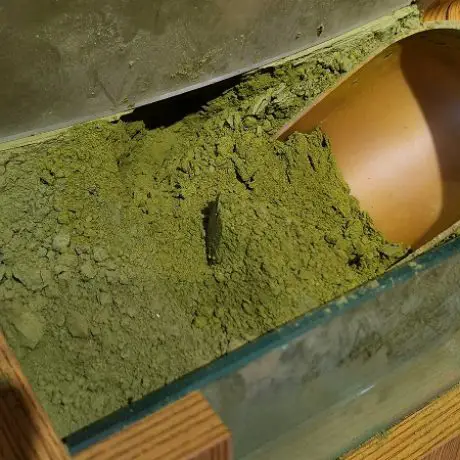
7) Coriander – Popular spice for Tunisian cooking
Coriander powder is made of grounded coriander seeds. It has an earthy and slightly tangy and citrusy taste. Grounded coriander is an important ingredient in Tunisian spice blend Tabil. It’s also used in many meat dishes and to season dishes like Djerbian rice, Tajine El Bey, Madfouna, and Market Khodhra. The best substitute for coriander powder is grounded cumin. Cumin has a stronger taste than coriander that’s why to reduce the amount of cumin.
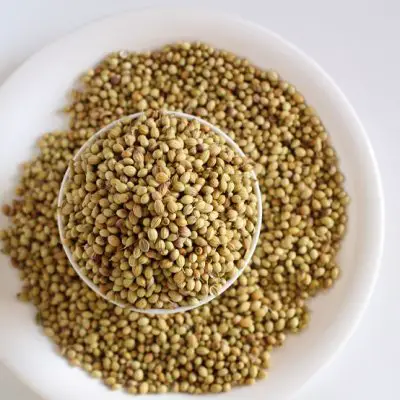
8) Caraway – Essential spice for Tunisian cuisine
An aromatic caraway powder is made of grounded caraway seeds. Caraway has an earthy and nutty flavor with a hint of fragrant anise, pepper, and citrusy. It’s a versatile spice and it’s used in many traditional Tunisian dishes: Chorba, Lablabi, Klaya, Djerbian rice, and Ojja. Besides grounded caraway seeds are an important ingredient in Tunisian spice mix Tabel. Due to the anise flavor of caraway, the best alternative for caraway is aniseeds and fennel seeds. Plus, cumin seeds are one option even though the flavor won’t be exactly the same.
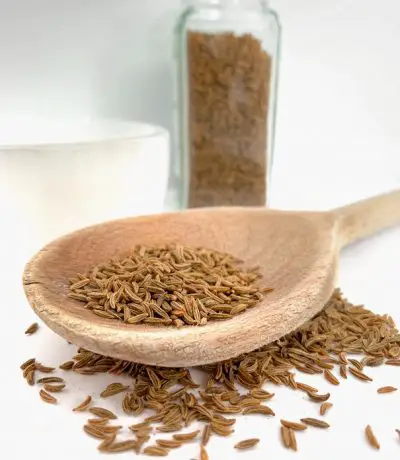
I hope you liked this little introduction to popular Tunisian spices. Which spice you would still add to this Tunisian spices list?
